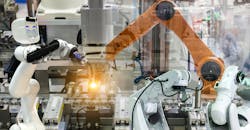Should Talent Be an Extension of Technology, or Vice Versa?
The questions that bother me are these:
1. Factories are among the most complex technical and social systems in our societies. Is it possible to control such complex systems with even more complex algorithms?
2. Will the addition of complex technology solve the problems we failed to master over the past 50 years?
Already at the time of 3.0, we saw painfully clear the clash between two worldviews that came about when craftsmen were replaced by machines; i.e., when we exchanged tools as extensions for humans and made humans extensions of tools.
The reality we currently see (and create) depends on the industrial worldview one adheres to:
Should man become an extension of technology? Or, should technology become an extension of man?
Part II of a four-part series. Read Part I.
Modern airplanes, the most complex machines I know, today can take off, fly to a destination and land fully automated. No pilot is needed in the cockpit. So let’s apply the above question: Is the pilot now an extension of his plane “just in case of”? And could we not replace him by a stewardess or even a random passenger? (These are real live questions!)
Or is the plane a beautiful instrument to the pilot, enabling him to fly very easily and safely in the vast majority of cases and allowing him to do what he is trained for in the case of unexpected situations—and to teach the designers how to even further improve the machine?
In other words: Do we respect and grow the craftmanship of machine-operators, or do we believe we can do without?
Grow people or eliminate them…?
The inventors of 3.0 are still using every employee to think about how the conversion, the value creation, can be done even better, faster, easier and more efficiently; there is a great emphasis on developing people (“hitozukuri”) and simplifying technology as much as possible.
They have a high focus on process control with self-regulating mechanisms, whereby the human scale is never lost from sight and the problem-solving abilities of people are used optimally.
The inventors of 4.0 seem to have very little faith in this: on the contrary, they assume that you have to remove the human factor from the daily process, leave the design of the systems to highly educated specialists and automate and centrally control everything.
The assumption is that the time lags and whip effects that MRP systems suffer so much from will be solved by having everything communicate with everything else via IoT.
In theory, this is quite conceivable. However, having worked for years in factories in many industries around the world, I am strongly biased in the other direction.
In the words of Henry Ford, “whether you think you can or you can't: you are right!”
In the next episode, I will elaborate on the conditions that need to be fulfilled in order to make the 4.0 concept possible in your factory.
Arno Koch has over 25 years of experience in process improvement and process control. His improvement goals are defined in terms of “halving” and “doubling.” He teaches process improvement at the CETPM at a German university, is partner at OEE Coach BV and owner of Makigami BV, and has written three books on OEE and two on Monozukuri (’the art of making things").
